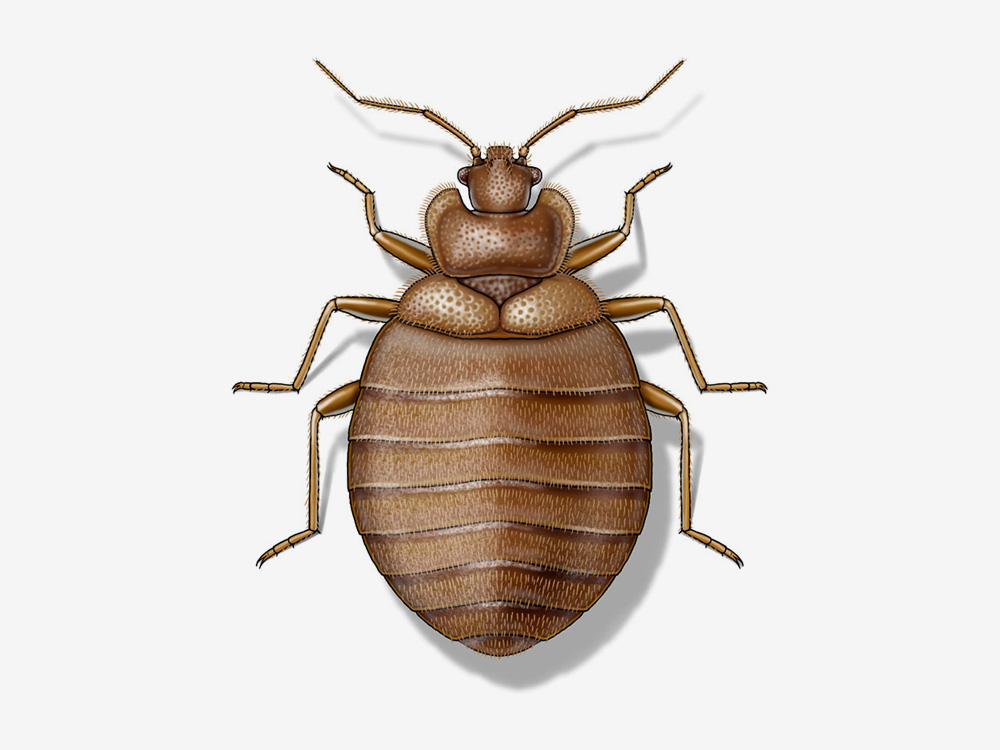Our Services
Bed Bug Control

Ecologic Entomology is Boston’s Bed Bug Authority
It’s important to act quickly if you suspect bed bugs in your home. The truth is, it’s easy to kill bed bugs, but difficult to eliminate infestations. The sooner the problem is identified, the simpler–and less costly–the solution will be. If you suspect bed bugs in your home, a knowledgeable expert must confirm the problem is truly bed bugs. If you reside in an apartment building, you should contact the building owner or manager immediately.
While the suspicion of bed bugs is being investigated, do not remove or relocate anything from your home into other areas of the building. In effect, quarantine all contents until after a bed bug inspection is complete. DO NOT discard potentially infested furniture, mattresses, and other belongings, as this is generally unnecessary even when bed bugs do exist. If bed bugs are confirmed, you will be advised of the prescribed remedy and how to prepare for it. Preparations will vary depending on the method employed for eradication.
For Do-it-Yourselfers
The internet is rich with many products that claim to eliminate bed bug infestations. The vast majority of these offerings are ineffective and misleading. We have many attendees in our training programs who give first hand accounts of how they were misled, ripped-off, or dissatisfied with these products. Aerosol “bombs”, botanical oils (cedar spray), and other “miraculous” potions exacerbate the problem. They should never be used.

Everything You Need to Know About Bed Bugs
They are small, feed on human blood and may be taking up residence in your establishment. We’re talking about bed bugs and there’s no doubt about it — the are back! After many decades of virtual extinction in the United States, bed bugs are now found in almost every region of the world as well as all 50 states. In fact, one-out-of-five Americans has come in contact with these bloodthirsty creatures or knows someone who has encountered them. Pest control companies regularly find infestations everywhere:
- Single-family homes, apartments, condominiums, as well as college campuses
- Hospitals, nursing homes and shelters
- Five-star hotels and budget motels
- Office buildings, retail stores, restaurants, movie theaters, and even on public transportation
What Do Bed Bugs Look Like?
Bed bugs are small insects with flat, wingless, oval-shaped bodies. They have six legs and two antennae. Other distinguishing characteristics include:
- Unfed adults are mahogany to rusty brown in color. After a blood meal, bed bugs turn reddish-brown. Nymphs, or baby bed bugs, are nearly colorless when they first hatch and become more brown as they mature.
- Adult bed bugs are about 1/4 inch long and are compared to apple seeds or lentils in size. The nymphs are even smaller.
Where Do They Hide?
Unlike residential locations, bed bugs in commercial settings tend to spread widely while looking for hosts. As a result, infestations sometimes become full-blown before people realize there is a problem. Some places bed bugs are found include:
- Under raised floors
- Inside room dividers
- Near furniture crevices and wood trim
- Around electrical boxes and outlets
- Behind wallpaper, picture frames and baseboards
- Anywhere employees or business visitors congregate, such as lunch areas, lounges, waiting rooms, meeting rooms, etc.
What Are the Signs of Bed Bugs and Are They Dangerous?
An early warning indicator of bed bug presence is small reddish-brown fecal spots on fabrics or spotting a bug directly. Bed bugs also leave behind molted skins and white, sticky eggs. Another sign that bed bugs may be present in your business environment is if employees complain of swelling and itchy, red welts on legs, arms and other body parts. Although bed bug bites are painless upon first contact, most people develop an allergic reaction to the saliva injected by the bug as it feeds, which may itch for days. However, some people do not have reactions to bed bug bites at all.
Unlike many other pests, bed bugs are not known to spread any specific diseases. However, they are considered to be a public health pest due to the extreme difficulty of controlling them and the mental health implications often triggered by infestations such as sleeplessness, anxiety and social isolation.

What Should I Do if My Facility Has Bed Bugs?
If someone reports bed bugs, it is important to respond immediately to the situation. The suspected area should be checked and the specimen collected, if possible, for identification by a pest professional. In addition, the finding of bed bugs should be disclosed to employees at this time.
Then, a pest management professional experienced in bed bug control should thoroughly inspect the area as soon as possible, confirm the presence of bed bugs and develop a treatment and control strategy. The rooms adjacent to any area found positive for bed bugs should also be inspected. Other valid inspection tools may include specially trained bed bug scent detection canine teams or bed bug monitors.
Monitors, dogs, and other tools have advantages and disadvantages depending on the situation; a trained pest professional can help guide you through the process. There are multiple treatment options available for professionals to eliminate bed bug infestations including:
- Vacuuming
- Freezing
- Steam
- Heat Treatments
- Fumigation
- Application of Pesticides
However, it can take several treatments, often using a combination of strategies, to control bed bugs, and follow up visits by a pest professional are often necessary.

Best Practices
There are many things you can do to minimize future bed bug problems on your property. Here are some proactive steps to take in preventing an infestation:
- Develop a written “bed bug action plan” in advance of any problems with the pest, outlining specific procedures and responsibilities for responding to a bed bug incident.
- Educate employees about bed bugs including how to recognize the pest and ways to minimize the likelihood of bringing them into the building from home.
- Identify the highest risk areas for bed bug introduction. These vary with the type of establishment but can include changing rooms, employee lockers and lounges, and customer lounging areas.
- If your facility experiences periodic introduction of bed bugs, consider implementing a regular detection program with the help of a pest
management professional.
Property Owners and Managers
There are many pest control companies touting their method as “the best.” In reality, there’s no such thing. With the exception of true fumigation (a rarity in the Northeast), no method currently available is one-hundred percent effective, one hundred percent of the time. Every situation needs to be assessed to determine the best course of action. If you’re spending a lot of money on failed treatments, STOP.
We don’t subscribe to the “one method is best” mentality. We prescribe whichever method, or combination of methods, is most suitable for the situation. Just as a doctors doesn’t prescribe one pill for every condition, we don’t prescribe one treatment for every situation. Standardized remediation ignores on-site realities, and wastes money on treatment failures.
Why Call Us?
We strictly follow a customized Integrated Pest Management Plan to control your problem pest. We pride ourselves in not over promising and underdelivering. Our technicians are required to perform a thorough inspection on each visit. We work with homeowners and business owners to eliminate the issue and work with you for further prevention. We also do not require yearly service plans. However it may be necessary to return for future inspections and treatments to completely eliminate your pests.
Let’s talk. We’re here to assist you with any pest concerns you may have.
We serve all of the following Massachusetts cities & towns:
Abington, Acushnet, Acton, Andover, Arlington, Ashland, Athol, Attleboro, Avon, Barnstable, Bedford, Belmont, Berkley, Beverly, Billerica, Boston, Bourne, Boxborough, Braintree, Brewster, Bridgewater, Brockton, Brookline, Burlington, Cambridge, Canton, Carver, Chatham, Chelmsford, Chelsea, Cohasset, Concord, Danvers, Dartmouth, Dedham, Dennis, Dighton, Dover, Dracut, Duxbury, East Bridgewater, Easton, Essex, Everett, Fairhaven, Fall River, Falmouth, Fitchburg, Foxborough, Foxboro, Framingham, Franklin, Freetown, Georgetown, Gloucester, Groton, Halifax, Hanover, Hanson, Harvard, Harwich, Haverhill, Hingham, Holbrook, Holden, Hopedale, Hopkinton, Hull, Ipswich, Kingston, Lakeville, Lancaster, Lawrence, Leominster, Lexington, Lincoln, Littleton, Lowell, Lunenburg, Lynn, Lynnfield, Malden, Manchester-by-the-Sea, Mansfield, Marblehead, Marion, Marlborough, Marlboro, Marshfield, Mashpee, Mattapoisett, Maynard, Medfield, Medford, Medway, Melrose, Mendon, Merrimac, Methuen, Middleborough, Middleboro, Middleton, Milford, Millbury, Millis, Milton, Nahant, Natick, Needham, New Bedford, Newbury, Newburyport, Newton, Norfolk, North Andover, North Attleboro, North Reading, Northborough, Northboro, Norton, Norwell, Norwood, Peabody, Pembroke, Plainfield, Plainville, Plymouth, Plympton, Quincy, Randolph, Raynham, Reading, Rehoboth, Revere, Rochester, Rockland, Rockport, Salem, Sandwich, Saugus, Scituate, Seekonk, Sharon, Sherborn, Shirley, Somerset, Somerville, Southborough, Southboro, Stoneham, Stoughton, Stow, Sudbury, Swampscott, Swansea, Taunton, Tewksbury, Wakefield, Walpole, Waltham, Wareham, Watertown, Wayland, Wellesley, West Bridgewater, West Newbury, Westborough, Westboro, Weston, Westport, Westwood, Weymouth, Whitman, Wilmington, Winthrop, Woburn, Worcester, Wrentham, and Yarmouth.
